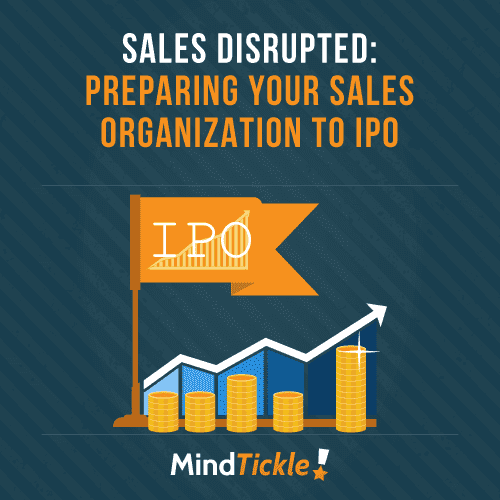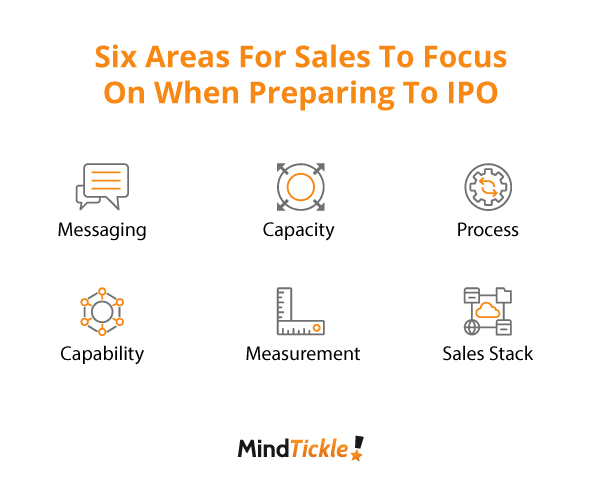 Preparing to IPO is a massive task. It’s not enough to have the legal paperwork and financial reporting ready, your business also has to be able to demonstrate that it’s up to the task. As Joe Sexton, who helped prepare our customer AppDynamics for its IPO journey, has said: “you have to act like a public company before you actually become one.”
Preparing to IPO is a massive task. It’s not enough to have the legal paperwork and financial reporting ready, your business also has to be able to demonstrate that it’s up to the task. As Joe Sexton, who helped prepare our customer AppDynamics for its IPO journey, has said: “you have to act like a public company before you actually become one.”
When it comes to your sales organization that means ensuring you have all the necessary rigors in place from your sales process to culture. This process should start about 24 months before you’re planning to IPO. There are six areas that we suggest focusing on when considering how to enable and prepare your sales organization to be ready to IPO.


Ensure your messaging is consistent
While consistent messaging is crucial for any sales organization, when your business is preparing to IPO its importance becomes elevated. It also becomes more important to look at consistent messaging from a data-driven perspective. From CEO to SDR, everyone needs to sing from the same songbook so your customers and the public see a cohesive sales machine. The entire company should be aligned on your message and articulate it because this will become a core part of your overall IPO strategy
Core to messaging is your company’s story.
MuleSoft, who recently made its public debut, refined its messaging with a core team of leaders. It then created a certification program to ensure each member of its frontline team was on message before they had customer conversations.
“We had the core team record themselves in the Mindtickle platform to provide examples and best practices. Then we formed a group of best performing reps and managers who we call black belts. This group of black belts then certified the full team. We had over 500 people go through this program,” explains Stephen Hallowell, VP of Sales Enablement at MuleSoft.
Leadership support was key to the success of their messaging as well as setting benchmarks and ensuring each rep received personalized coaching. AppDynamics also underwent an extensive company-wide process to certify their reps on consistent messaging. Each rep had three chances to achieve certification of their message or they were out.
Build capacity for growth
Investors will want to see a company that is growing and poised for further growth. This is not the time to take your foot of the pedal, a business that is preparing to IPO should be continuing to scale sustainably. In fact, public tech investors like revenue growth rates above 30% in the two forecasted years after the IPO. Others suggest that a business should already be achieving $100 million in revenue by the time they IPO, and still be growing.
Building the capacity for growth isn’t just about adding more reps though. In fact, the key to building sales capacity is ensuring you’re not over-investing. In order to grow a business needs more reps who are selling more effectively and meeting quota. You need to do more, smarter, better with the resources you have as well.
This goes beyond just looking at quotas and considering how to ensure more of your reps are able to achieve or even smash their quota. If you’re hiring new reps, how long does it take them to ramp up and what can you do get them fully ramped up quicker. How effective are your current reps? Can you identify what is causing them to lose deals?
This can be achieved in several ways, enablement initiatives like onboarding and effective sales coaching can make a significant step change in the way your reps perform. For example, Mulesoft executed a structured coaching program to drive behavioral change. They identified execution gaps and built competency maps to help them pinpoint where to target their coaching efforts to make a real difference in the performance of their sales reps.
AppDynamics looked at the yield of each rep, being what the rep should be able to produce. This yield helped them define their sales capacity and identify what capacity they needed to hit their targets.
Button down your processes
Before IPO, all your sales processes need to be rock-solid. That means having in place everything from demand generation tools to pipeline management. Processes should be streamlined, understood and scalable. Investors will expect execution excellence. This means more than just having a consistent sales process and methodology that is used by all reps. Coaching processes should also be in place to ensure any gaps are identified and able to be rectified quickly.
It’s also important to look across your entire customer facing team. While much effort is focused on field sales reps, inside reps and even customer success teams play an important role. By qualifying leads and ensuring they are nurtured or moved onto field sales when the time is right inside sales helps improve efficiency and reduce your sales cycle. While customer success can play an important role in customer retention and renewals.
AppDynamics developed a culture of excellence in pipeline generation. Every Monday field sales reps focused on prospecting, according to our VP of Sales, Cameron Essalat, this was called PG (pipeline generation) Mondays. , in addition to marketing, partners and inbound sales. These efforts supercharged their sales pipeline and helped the business continue to scale rapidly.
Continue to invest in capability
Creating a strong pipeline is important, but the investment will be sunk if your reps are not able to convert those leads. This is where focusing in on sales effectiveness to build capability is key.
Your reps’ skills need to continue to be developed so they can constantly improve and stay on top what they need to. Building capability can include enablement initiatives that ensure regular communication, develop structured coaching and provide reps with tools that keep them constantly up to date and primed to sell at their best.
The more you invest in your sales team the more important retention becomes. This is why it’s also important to consider the type of sales culture you want for your business and put in place processes and initiatives to help you achieve this.
Measurement is imperative
You’re no longer a small startup that’s testing a new product. By the time you’re 24 months out from IPO, your business will be still scaling but revenue should be becoming more predictable. But just because your revenue is predictable doesn’t mean you shouldn’t maintain a tight rein over your performance.
To control and identify issues before they become major problems it’s important to identify what areas have the power to transform or derail your sales. Then you can determine which leading indicators to monitor so you can stay ahead of the game and make any necessary adjustments to keep you on track. If you’ve only got an eye on lagging indicators like topline revenue, you aren’t giving yourself an opportunity to foresee issues and address them before it’s too late.
Build a sales stack that supports growth
Your sales stack should support your growth and help your reps sell, not give them yet another thing to learn. Precious time and resource can be saved by building a sales stack that is intuitive and leverages integrations wherever possible.
Many efficient businesses anchor their sales stack to their CRM so reporting and activity can be streamlined in one place. It makes sense, but of course, your sales stack must also support your other core initiatives to create consistent messaging, build capacity and capability and execute your processes. With these six measures in place, you can not only prepare your business to IPO when the time is right but also help it continue to scale and achieve its growth potential.








